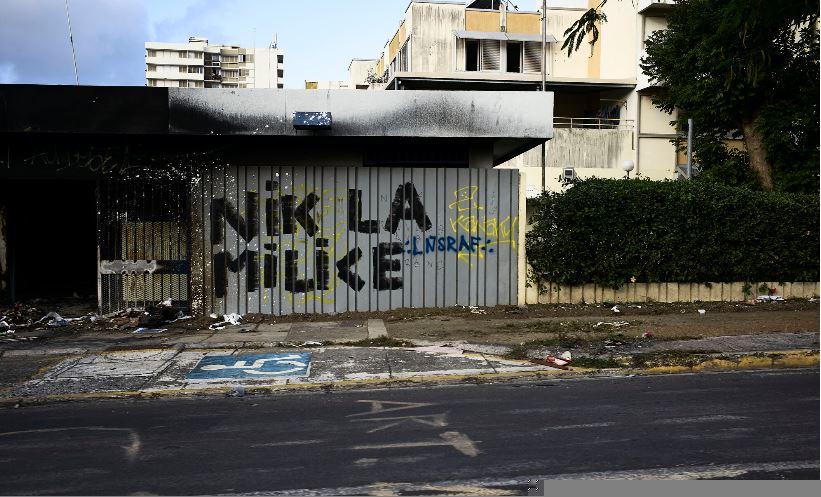08/06/2024 via: sansnom Translated by Act for freedom now!
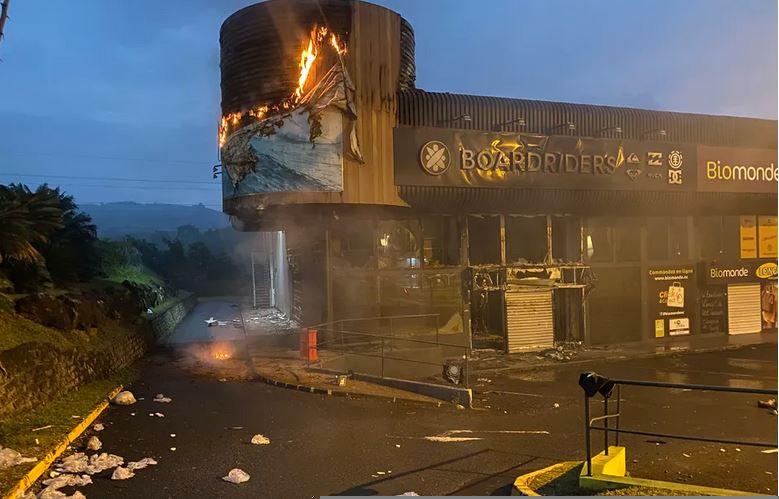 13th May 2024. The shopping centre « Kenu In » goes up in smoke from the first night of the insurrection
13th May 2024. The shopping centre « Kenu In » goes up in smoke from the first night of the insurrection
Despite the efforts of the French colonial authorities, who day after day backed with numerous press releases are announcing a return to normal, the situation in New-Caledonia is far from being settled four weeks after the outbreak of the uprising of a part of the Kanak youth. And some signs are unmistakable, such as the continuation of the curfew (18h-6h) at least until June 17, the requisition of petrol stations for the exclusive use of cops and military that has just been lifted on June 8th, or the fact that the international airport of La Tontouta remains closed «until further notice». Only the airfield of Magenta has been open to commercial flights again since June 5th, or internal flights to New Caledonia to Lifou, Ouvéa and Maré, and nearly 500 French tourists are still blocked on the island after three weeks. As for the North of New Caledonia, it is the army that takes charge directly of the supplying (and therefore rationing and priorities) of the stores, managing the containers that arrive at Koné by barge.
At present, despite the pressure of the 3,500 cops and soldiers sent to the scene, some roadblocks in the neighbourhoods of Nouméa or along the 50 km road leading to the airport, are still being re-erected by Kanak insurgents after their dismantling, without omitting to trap them with gas cylinders at times or even prepare some little surprises for the blues: on June 4th in Dumbéa, for example, a gendarme fell down a manhole after walking on branches that had been placed over it to mask the opening. “With a depth of 1m20, concrete re-inforced irons 2 mm in diameter had been positioned vertically at the bottom to create piles. The gendarme was impaled by one leg and a metal stake that had got in between his bullet-proof vest and body vest, which had pierced but without penetration thanks to the Kevlar plate.”
In total, of this archipelago of 270,000 inhabitants, 212 police officers and gendarmes have been injured since May 13, but also a significant number of Kanaks that the authorities officially refuse to account for, but which we know is considerable and sometimes very serious: several insurgents have lost an eye or had facial bones smashed following shots from police flash balls, others have bullet wounds and are in coma.
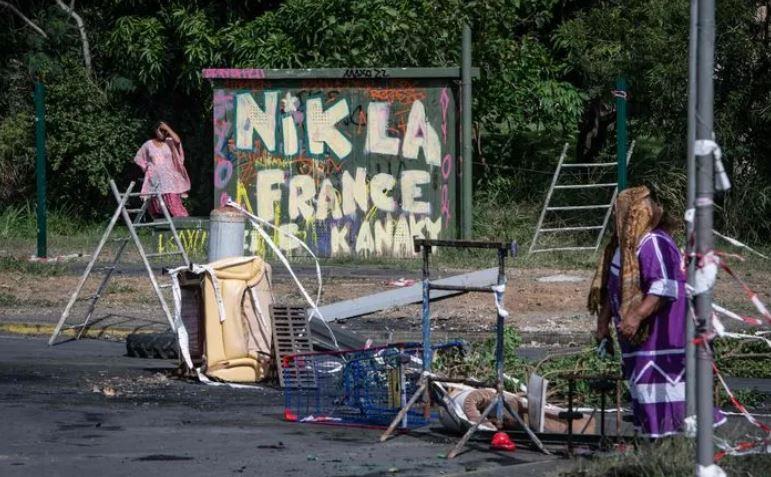
Gendarmes murderers
Two recent examples: on May 29th in Dumbéa, at around 8pm during the attack on a roadblock by the cops, the latter suffered numerous stonings but also a rifle shot. The GIGN responds and fires six times “towards” the shooter. An insurgent is seriously injured: «Despite surgery, his prognosis is still serious, the forensic findings indicating the presence of two projectiles, one in the chest and the other in the shoulder».
Then on June 3rd at 4 pm at the Col de la Pirogue, at the level of the dam of the tribe of Saint-Laurent, on the strategic road leading to the international airport, the gendarmes open fire on Kanak insurgents (who according to the cops had shot first at their vehicle) One is shot in the shoulder and another in the head. We learned on Saturday, June 8th that the latter, Lionel Païta, died in hospital, bringing to eight the number of deaths in the territory (five Kanaks including two from Canala, one from Maré, one from Poindimié, one from Païta, a caldoche [of French descent] in Kaala-Gomen who had shot at two gendarmes, one killed by a colleague).
Needless to say that in such a situation, crazy rumours spread re the number of «missing» well beyond the 8 official deaths (see here), while the prisons of Nouméa and Koné are full to the brim and Kanak prisoners are deported to Polynesia and Fresnes (see here), the official balance sheet announces 726 in police custody, 115 referrals to court and 60 warrants of committal since May 13th.
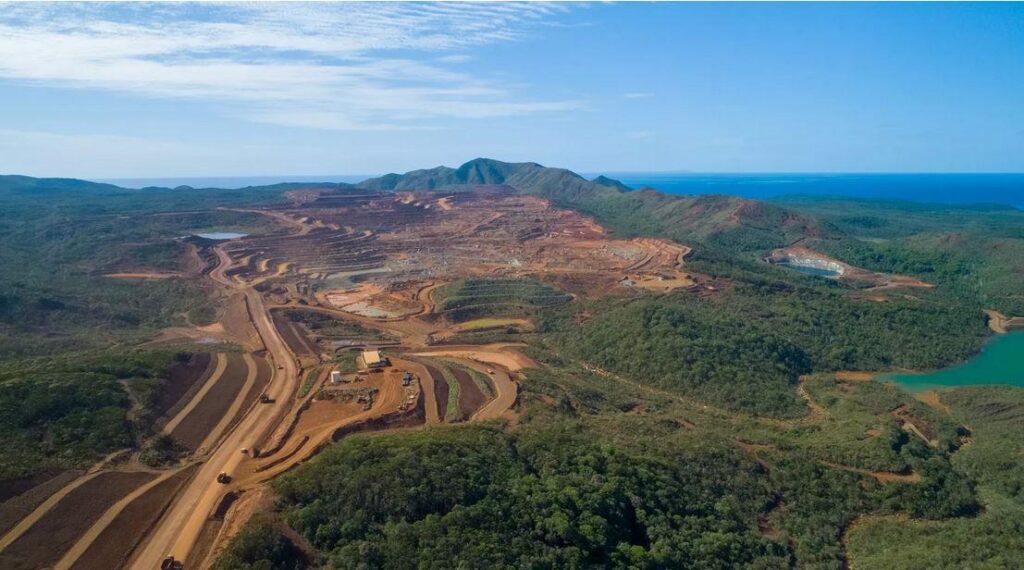
The nickel industry
To put it briefly, New Caledonia has a quarter of the world’s nickel reserves, operated in open-pit mines, to supply three pyrometallurgical processing plants. The first two produce ferronickel, a lower-quality blend that is used for stainless steel, and the third is battery-grade nickel (primarily intended for Tesla since 2021).
The first factory (Koniambo Nickel, KNS), owned by Kanak separatists in the north, has been shut down since February 2024 and the withdrawal of its reference shareholder, the Swiss commodity trading giant Glencore. The activity is now focused solely on maintaining the furnaces (If the furnace in a metallurgical plant is shut down without being supplied with ore or electricity, not only can it be permanently damaged if the shutdown is sudden, it also takes months to restart it).
The second factory, the historic one of the SLN founded in 1880 (Société Le Nickel, owned 56% by the French group Eramet, itself owned 27% by the French State) located in Doniambo, was already in bankruptcy before the insurrection, and kept alive artificially thanks to a State loan of 60 million euros last February. In addition, Eramet also wants to get rid of its metallurgical activities in New Caledonia, especially since it operates the largest nickel mine in the world, Weda Bay, on the island of Halmahera (Indonesia) in the midst of primary forests, and it has just obtained huge lithium mining concessions in Chile and Argentina. In Kanaky, with all the five mining sites that supplied it blocked for four weeks, while its ore stock has eventually run out, not to mention the riots that took place a few hundred meters from its factory, this is the object of several counter-insurgency operations of the French State.
As for the third plant, referred to as the South one and located in Goro, owned by the Prony Resources consortium, it is also in default of payment and only survives thanks to a loan from the French State of 140 million euros granted in March. Its reference shareholder, the Swiss trader Trafigura, has been wanting to sell its shares for months, and the famous «contract of the century» signed in 2021 with Tesla is already far away. As with the SLN, Prony Resources’ activities at the mine and the factory have been halted since the beginning of the uprising, even though its hydro-metallurgical process is different from that of the other two factories in the archipelago.
 7th June 2024. The « Mutuelle du nickel »and the BNP did not escape the incendiaries in Dumbéa
7th June 2024. The « Mutuelle du nickel »and the BNP did not escape the incendiaries in Dumbéa
At the root of this uprising of the Kanak youth, in addition to colonization, racism, humiliation and prison, is also the stake of nickel, including the pyrometallurgical factories that provide all the artificial wealth of the island (90% of the archipelago’s exports and 25% of jobs) were already almost bankrupt or on standby before the uprising. This concerns all the three main forces present on the archipelago, with the factory of the North (Kanak), the South (loyalist) or the State (SLN). In ten years, Indonesia has indeed increased from 0 to 55% of the world production of nickel (against currently 5% for New Caledonia) with Chinese capital, which caused prices to collapse by nearly 43% in 2023 alone, thanks to unbeatable labour force and electricity prices.
Faced with this, the State has been trying for months to recover a colony that it does not want to let go at any price, by trying to negotiate with the New Caledonian government (composed of loyalist and separatist parties, and led by the latter) a «Nickel Pact» of €200 million in subsidies on the cost of energy, with the counterpart that the factories would commit to providing as a priority the European market with batteries for electric vehicles; that this local government increase taxes significantly; it authorizes the export of much more raw ore; and it temporarily restores the jurisdiction of the mining code to the State.
In short, this «Nickel Pact» which has seen eight versions since November 2023 and is still not signed, is a project aimed at intensifying nickel extraction for the metropolis, which would transform the Kanaky into a purely mining territory, definitively embedded in a neo-colonial framework. Unlike the famous Noumea agreements of 1998, supposed to buy social peace, and which planned to use the mining rent to promote the development of New Caledonia until its possible independence (hence the three referendums on the latter from 2019 to 2021, the transfer of mines and a factory to the Kanak bourgeoisie, and the creation of a local government).
The «Nickel Pact» is therefore hitting both the Kanak politicians who relied on this resource to base their economic independence (in “The State wants to steal our nickel” mode) both the urbanized Kanak youth who were already denouncing corrupt politicians and who never see anything of all the money spilled on the archipelago, or even tribal kanak collectives that are increasingly seeing the devastation caused by the intensification of extractivism (on river pollution, health or landslides), and are beginning to advocate an independence that would chase away the French State and also the mines.
We therefore understand why the vote in the Senate on April 2nd and then in the Assembly on May 15th of the thaw of the New Caledonian electoral body (blocked since 1998), resulting in the perpetuation numerically of the colonization of the archipelago, could have been the spark of an insurrection that methodically devastated the shops and industries of the island’s capital. Destroying 570 companies and causing more than 1.5 billion euros’ direct damage, according to the latest assessment of the high commissioner (prefect) Louis Le Franc, made public on June 7.
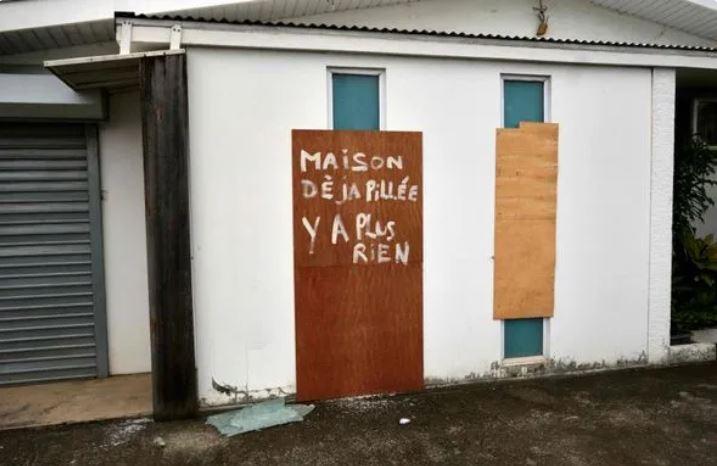
The Kanak politicians lose control and appeal for calm in vain
When the situation exploded on Monday 13th of May on the occasion of the blockade of the greater Noumea, after six months of mobilizations against the thaw of the electoral body (including demonstrations of 3000 people in late November, 5000 on 25 February, 15,000 on 28 March and 60,000 people on 13 April), the Kanak politicians quickly lost control, and not only called for calm, but also condemned the actions of the insurgents.
In the face of groups of mobile, autonomous, Kanak youth, looters and destroyers, it was on behalf of the CCAT (Field Action Coordination Cell) that Christian Tein launched a call for calm on 14th May on the independentist radio, Radio Djido: “I call on all of our young people to step back. To stay where they are, on the side of the road, organized, structured. The CCAT never called for looting stores,” while also soliciting parents to “not let [the youth] go in every direction.” A line that will not vary, so that on May 15th in a statement, this cell will specify «our fight for free Kanaky will be long and fraught with obstacles, so the CCAT calls on all citizens mobilized on the ground for appeasement and respect for the instructions», and again on May 31st, adding that “the CCAT has never called for violence, looting or harming people… [It] does not condone acts of vandalism. These acts must not tarnish our struggle for the good of all the citizens of Kanaky.”
But getting back to May 14th, since that same day Daniel Goa, president of the main independence party of the FLNKS, the Caledonian Union (UC, besides at the origin of the creation of the CCAT in November 2023), also published his statement, in which he called “our youth to remain calm, to show patience and to stop all abuses, all looting that does not honour us. That’s not dignity and freedom,,, The looting orchestrated this night is our dishonour and in no way serves our cause and our struggle, at worst they delay it… That is not the face of a Kanak. We do not fly home, we are worthy. To all the business leaders touched in their flesh, their property, their plans to make the Country live, I bring them our full support, all our compassion and our great disapproval. Work tools must be made safe.”
Also on May 14th, Louis Mapou, a member of the second main independence party of the FLNKS, the Palika (Kanak Liberation Party), and president of the local government of New Caledonia since 2021, also called in a statement for «calm and reason» adding that “all the reasons for discontent, frustration and anger cannot justify hurting or destroying what the country has been able to build over decades and mortgaging the future.”
Finally, let us add that even the traditional Kanak authorities then got involved, in vain, as the customary Senate chaired by Victor Gogny, which issued its solemn statement, in which he enjoined that “it is imperative that the youth show restraint and citizenship, and promote dialogue and cooperation to express their legitimate demands and aspirations.” Quickly joined by the National Council of chiefs (Inaat ne Kanaky, created in 2022), again on May 14th after the first night of insurrection, which came in turn to “call the youth to calm, wisdom and respect for the instructions given by the officials”.
And to conclude, it is directly the FLNKS (Kanak and Socialist National Liberation Front) which released on May 15th its own position on the ongoing insurrection, which is at least explicit about its role as co-manager of the colony since the Matignon agreements (1988) then de Noumea (1998): “The FLNKS, committed to the economic and social development of the country, deplores the actions perpetrated against companies and provides support to the business leaders and employees impacted… It calls for the lifting of barricades to allow free access of the population to products, services and basic needs. This appeal is also addressed to all the political authorities, customary of this country so that each one where he is, contributes to bring back serenity and calm to our populations.”
A request heard by members of the CCAT who due to lack of a plane to be able to return to the country, held a meeting at the CICP of Paris this same May 15th, during which Romuald Pidjot, deputy secretary of the Caledonian Union, specified that “the role of the CCAT will be to try to calm these young people down, but we will need the help of the State,” while Rock Haocas (head of the USTKE union and general coordinator of the Labour Party, the other major component of the CCAT) could only deplore: “Urban warfare is not what we wanted, but young people have reached a stage that we can no longer control. We are in a phase of rupture, and it’s not due to not having warned.”
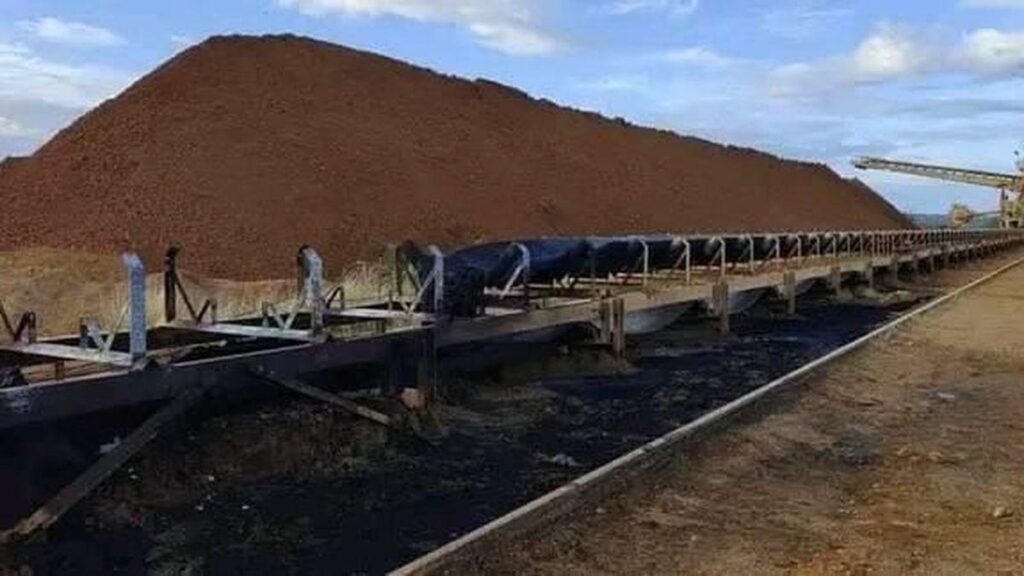 June 2, 2024. Arson of the nickel conveyor at Nepoui, when it was required to urgently load an ore vessel for the Noumea SLN plant
June 2, 2024. Arson of the nickel conveyor at Nepoui, when it was required to urgently load an ore vessel for the Noumea SLN plant
Sabotage the nickel industry
From the beginning of the insurrection, one could legitimately wonder about the situation of the nickel mines and factories in terms of sabotage (or not). Outside the capital Noumea, dotted with barricades, looting and fires caused by young Kanak insurgents, what was it like «in the bush» and «in the tribe», where half of the Kanak population live? Even if one suspects that the information is hard to filter through, it seems that it was mainly the mining structures of the SLN (or the State) that had been attacked, but also that of Prony Resources (the Southern loyalist factory):
in Nepoui, a village located in the centre of the west coast, an ore tanker arrived in a hurry on June 2, to load 19,000 tonnes of nickel to be brought back to Noumea in order to supply the SLN plant in Doniambo, which had finished its three weeks of stocks, and risked its furnaces being “irreparably damaged”. Only boom, in the middle of the night part of the conveyor was set on fire, involving a hundred meters of the conveyor belt. Result: the loaded ore tanker arrived safely one day late (June 4), knowing that the Doniambo plant now needs to receive such a boat every three to four days in order to operate. Since then, the SLN has sent a second tanker, but this time much further north (near the Tiébaghi mine, at Koumac), hoping that the young Kanaks would be less hostile to him.
in Houaïlou, a village on the east coast, the Centre de Formation aux Techniques de la Mine et des Carrières (CFTMC) [mining training centre] located on the Poro mine was completely destroyed: “All training tools, mining equipment, classrooms, driving simulators were ransacked, vandalized and burned.” It trained young people who wanted to work in the mining sector.
In Noumea, as early as 9 May at around 4am, the lookout positioned on the wharf had been calmed down by unknown people, before the moorings of the Prony Express ferry used for transporting employees of the Prony Resources plant were cut. The launch was then set adrift. Then in Goro, located in the south of the island at an hour and a half by car from the capital, it was directly the factory of Prony Resources to be attacked on May 23 and lose two vehicles. Since then it has been guarded day and night by 35 security guards of the private security group Erys, but the industrial and mining complex is still far from being able to restart, and even set off, on June 7, its «Specific Intervention Plan» (PPI), a program to enhance its security against external threats. In this case, “the current disruption has forced us to stop our operations. We are facing an interruption of raw water supply from Lake Yaté but also, since June 4th, we are no longer being supplied with electricity,” the industrial giant said a few days ago, without daring to talk about sabotage…
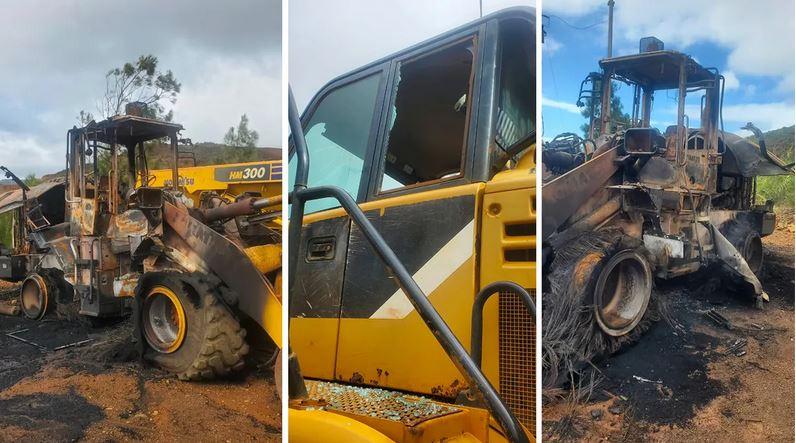 June 7, 2024. The mining machinery of the «Centre de Formation aux Techniques de la Mine et des Carrières» is reduced to ashes in Houaïlou
June 7, 2024. The mining machinery of the «Centre de Formation aux Techniques de la Mine et des Carrières» is reduced to ashes in Houaïlou
For an insurrection not to die, it needs, for example, to deepen and overcome its internal contradictions, but also oxygen, a lot of oxygen. To everyone here, within the French colonial metropolis that is in the act of crushing the Kanak insurgents who have not yet put down their hands (or their weapons), to give it the maximum. Out of solidarity, or quite simply out of hatred of one’s own State…
[Summary of the local press and not only, June 8, 2024]
NB: this article follows on «New Caledonia: the colonial state facing the Kanak prisoners» (1 June), «In Kanaky, nothing is finished… » (25 May) and “The Number of the Day in Kanaky: 400 and 1” (May 21)
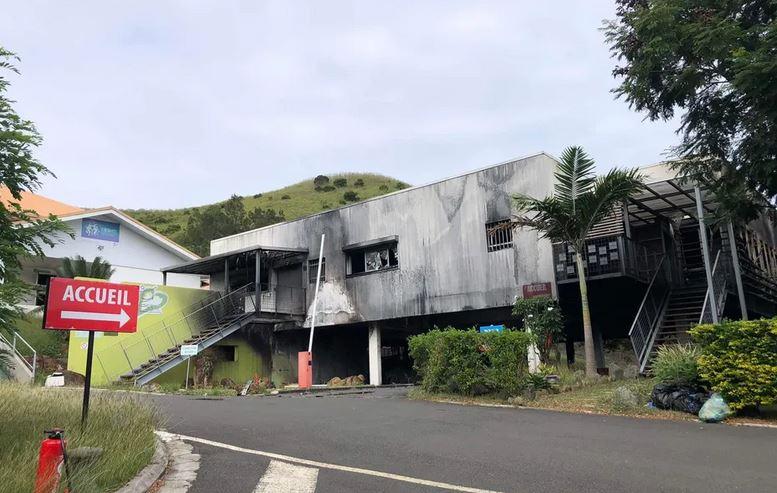 15 May 2024. The “Institut de formation des professions sanitaires et sociales” in Nouville (Nouméa), destroyed by fire
15 May 2024. The “Institut de formation des professions sanitaires et sociales” in Nouville (Nouméa), destroyed by fire
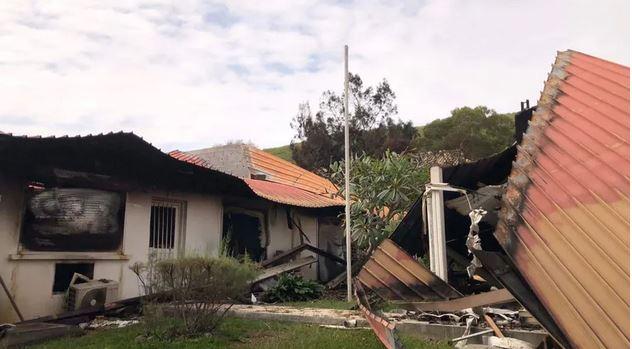 idem
idem
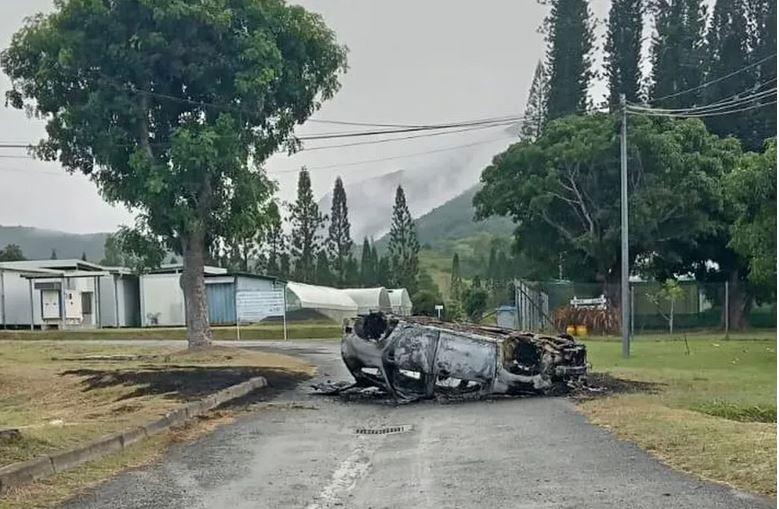 May 26, 2024. The “Institut agronomique calédonien” (IAC), which develops the forest and wood sector, completely looted and ransacked in Païta
May 26, 2024. The “Institut agronomique calédonien” (IAC), which develops the forest and wood sector, completely looted and ransacked in Païta
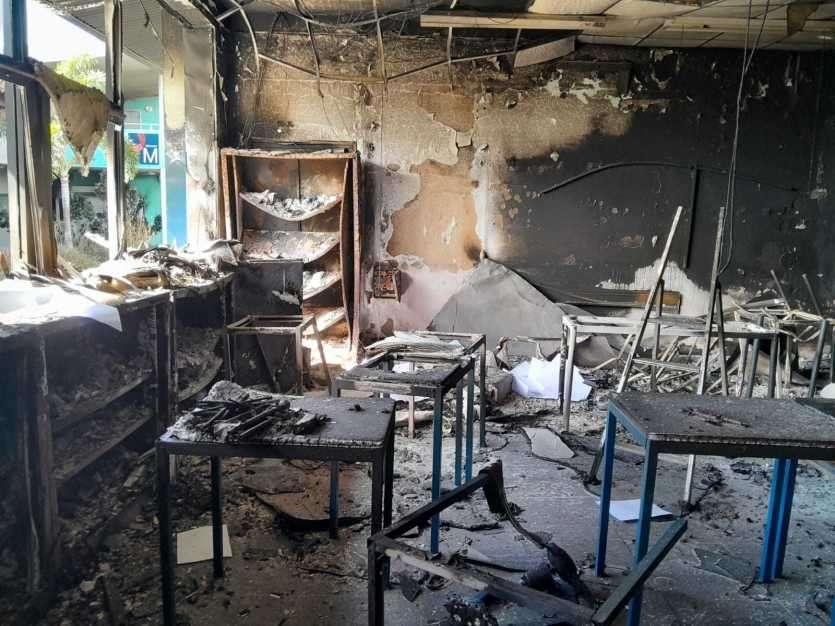 June 2, 2024. The only CFA (Centre de formation des apprentis) of the archipelago, looted, ransacked and then burned 90% by rioters.
June 2, 2024. The only CFA (Centre de formation des apprentis) of the archipelago, looted, ransacked and then burned 90% by rioters.
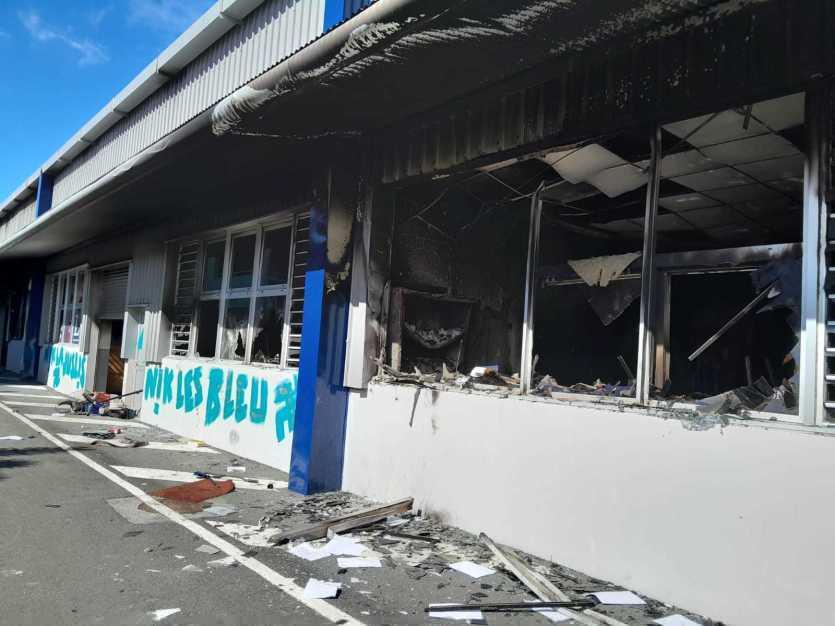 ditto
ditto
